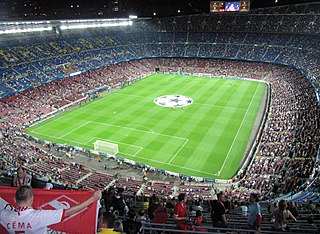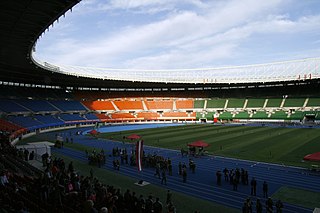
The 1988–89 European Cup was the 34th season of the European Cup football club tournament. The competition was won by Milan, the first time since 1969 and third time overall, comfortably defeated former winners Steaua București in the final.

The 1989–90 European Cup was the 35th edition of Europe's premier club football tournament, the European Cup. The final was played at the Praterstadion in Vienna on 23 May 1990. The final was contested by Italian defending champions Milan and Portuguese twice former winners Benfica. Milan successfully defended their title with a 1–0 victory, securing their fourth European Cup trophy. Milan remained the last team to successfully defend their trophy until Real Madrid did it again in 2017. Arsenal were denied a place in the competition, as this was the last year of a ban from European competitions for English clubs following the Heysel Stadium disaster of 1985.
The 1995–96 UEFA Cup was the 25th season of Europe's then-tertiary club football tournament organised by UEFA. It was won by German club Bayern Munich on aggregate over Bordeaux of France. Girondins de Bordeaux went to the finals all the way from the 1995 UEFA Intertoto Cup, its first season, being the only Intertoto Cup entrant to reach this far of the UEFA Cup. With this victory, Bayern became the third club to have won all three major European trophies. The finals itself was the only UEFA Cup final during the 1990s to not feature any Italian sides.
Standings and results for Group G of the UEFA Euro 2008 qualifying tournament.
The 2010 FIFA World Cup qualification UEFA Group 1 was a UEFA qualifying group for the 2010 FIFA World Cup. The group comprised 2006 fourth-place finishers Portugal, along with Sweden, Denmark, Hungary, Albania and Malta.
The 2006 FIFA World Cup qualification UEFA Group 2 was a UEFA qualifying group for the 2006 FIFA World Cup. The group comprised Albania, Denmark, Georgia, Greece, Kazakhstan, Turkey and Ukraine.
Standings and results for Group 6 of the UEFA Euro 1984 qualifying tournament.
The qualification matches for Group 3 of the European zone (UEFA) of the 1994 FIFA World Cup qualification tournament took place between April 1992 and November 1993. The teams competed on a home-and-away basis with the winner and runner-up claiming 2 of the 12 spots in the final tournament allocated to the European zone. The group consisted of Albania, Denmark, Latvia, Lithuania, Northern Ireland, the Republic of Ireland and Spain.
The 1990 FIFA World Cup qualification UEFA Group 2 was a UEFA qualifying group for the 1990 FIFA World Cup. The group comprised Albania, England, Poland and Sweden.

Standings and results for Group 10 of the UEFA Euro 2004 qualifying tournament.
Standings and results for Group 2 of the UEFA Euro 2000 qualifying tournament.
Standings and results for Group 3 of the UEFA Euro 2000 qualifying tournament.

Standings and results for Group 7 of the UEFA Euro 1996 qualifying tournament.
The 1986 FIFA World Cup qualification UEFA Group 1 was a UEFA qualifying group for the 1986 FIFA World Cup. The group comprised Albania, Belgium, Greece and Poland.
The 2014 FIFA World Cup qualification UEFA Group E was a UEFA qualifying group for the 2014 FIFA World Cup. The group comprised Norway, Slovenia, Switzerland, Albania, Cyprus and Iceland.
The 2014 FIFA World Cup qualification UEFA Group I was a UEFA qualifying group for the 2014 FIFA World Cup. The group comprised 2010 FIFA World Cup winners Spain, along with France, Belarus, Georgia and Finland.
The 2015 FIFA Women's World Cup qualification UEFA Group 5 was a UEFA qualifying group for the 2015 FIFA Women's World Cup. The group comprised Albania, Belgium, Greece, Netherlands, Norway and Portugal.
The qualifying rounds for the 2001–02 UEFA Champions League began on 11 July 2001. In total, there were three qualifying rounds which provided 16 clubs to join the group stage.
Group 9 consisted of six of the 50 teams entered into the European zone: Albania, Armenia, Germany, Northern Ireland, Portugal, and Ukraine. These six teams competed on a home-and-away basis for two of the 15 spots in the final tournament allocated to the European zone, with the group's winner and runner-up claiming those spots.
Group 1 consisted of five of the 34 teams entered into the European zone: Albania, Austria, Bulgaria, Finland, and West Germany. These five teams competed on a home-and-away basis for two of the 14 spots in the final tournament allocated to the European zone, with the group's winner and runner-up claiming those spots.



